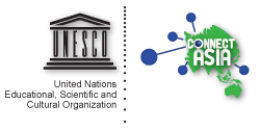What is the "UNESCO Biosphere Reserves as Learning Laboratories for Sustainability" Masterclass?

This masterclass is a blended learning experience with immersive workshops occurring in Biosphere Reserves accompanied by lectures streamed live from this website. The initial modules focus on local issues exploring community engagement, partnerships and projects, while the concluding modules focus on global issues across the Asia-Pacific. The masterclass will introduce opportunities for knowledge sharing, virtual collaborations and the future possibilities of creative technology in responding to climate change.
The network of UNESCO biosphere reserves across the Asia-Pacific region offers a unique opportunity for synthesizing experiences and sharing knowledge in response to the ramifications of climate change. There is a clear need to develop accessible tools that enable biosphere reserves to share their experiences, particularly when communities across the Asia-Pacific are experiencing more natural disasters. One of the most critical tools will be the ability to creatively and collaboratively share advice, ideas and actions from other communities who have had similar experiences. There is a clear opportunity for UNESCO biosphere reserves to become a catalyst for new ideas and truly become active learning laboratories for sustainability and adaptability in response to climate change.
This masterclass will draw on a series of interactive case studies and highlight a wide spectrum of projects and opportunities occurring in biosphere reserves across the Asia-Pacific. There are many Asia-Pacific biosphere reserves that are already demonstrating exceptional practices as living laboratories for interdisciplinary thinking and action in the conservation of biological and cultural diversity. These sites are showcasing original approaches towards sustainable development in community contexts and will act as important case studies in understanding the future potential of biosphere reserves in the Asia-Pacific region.
The virtual masterclasses are delivered through four interactive sessions with the following themes:
The weekly sessions will commence at 1:30pm AEST (Australian Eastern Standard Time) which is 10:30am in our networked locations in Indonesia (Jakarta), Cambodia (Phnom Penh) and Vietnam (Hanoi). We welcome participation from anywhere in the world. Please visit our registration page to enrol in the program.
The Immersive Masterclasses in UNESCO Biosphere Reserves are occurring in two Australian Biosphere Reserves in February 2015. The focus areas are Great Sandy Biosphere Reserve in Queensland and Mornington Peninsula and Western Port Biosphere Reserve in Victoria. The duration of each session is four hours and will include a mixture of demonstrations, field work and guided environmental monitoring in the biosphere reserve.
The immersive workshops focus specifically on creative approaches to ecosystem monitoring and interdisciplinary research. Participants will be introduced to the latest technologies in the emerging fields of acoustic ecology and bioacoustics and gain new insight into the value of sound in understanding environmental patterns and changes. When creativity, technology and science are combined there are infinite opportunities to respond to climate change in innovative new ways. As the international interest in the emerging auditory fields of bioacoustics and acoustic ecology continues to expand, there are a wide spectrum of opportunities to harness virtual technologies to develop accessible community engagement around the creative and scientific possibilities of listening to the environment. This immersive masterclass introduces the latest concepts in non-invasive monitoring involving auditory recordings of the environment. Please visit our registration page to enrol in the program.
The network of UNESCO biosphere reserves across the Asia-Pacific region offers a unique opportunity for synthesizing experiences and sharing knowledge in response to the ramifications of climate change. There is a clear need to develop accessible tools that enable biosphere reserves to share their experiences, particularly when communities across the Asia-Pacific are experiencing more natural disasters. One of the most critical tools will be the ability to creatively and collaboratively share advice, ideas and actions from other communities who have had similar experiences. There is a clear opportunity for UNESCO biosphere reserves to become a catalyst for new ideas and truly become active learning laboratories for sustainability and adaptability in response to climate change.
This masterclass will draw on a series of interactive case studies and highlight a wide spectrum of projects and opportunities occurring in biosphere reserves across the Asia-Pacific. There are many Asia-Pacific biosphere reserves that are already demonstrating exceptional practices as living laboratories for interdisciplinary thinking and action in the conservation of biological and cultural diversity. These sites are showcasing original approaches towards sustainable development in community contexts and will act as important case studies in understanding the future potential of biosphere reserves in the Asia-Pacific region.
The virtual masterclasses are delivered through four interactive sessions with the following themes:
- Learning Laboratories for Sustainability (February 17th)
- Connecting Communities with Creative Technology (February 24th)
- Creative Approaches to Ecosystem Monitoring & Interdisciplinary Research (March 3rd)
- Interactive Case Studies & Future Possibilities (March 10th)
The weekly sessions will commence at 1:30pm AEST (Australian Eastern Standard Time) which is 10:30am in our networked locations in Indonesia (Jakarta), Cambodia (Phnom Penh) and Vietnam (Hanoi). We welcome participation from anywhere in the world. Please visit our registration page to enrol in the program.
The Immersive Masterclasses in UNESCO Biosphere Reserves are occurring in two Australian Biosphere Reserves in February 2015. The focus areas are Great Sandy Biosphere Reserve in Queensland and Mornington Peninsula and Western Port Biosphere Reserve in Victoria. The duration of each session is four hours and will include a mixture of demonstrations, field work and guided environmental monitoring in the biosphere reserve.
The immersive workshops focus specifically on creative approaches to ecosystem monitoring and interdisciplinary research. Participants will be introduced to the latest technologies in the emerging fields of acoustic ecology and bioacoustics and gain new insight into the value of sound in understanding environmental patterns and changes. When creativity, technology and science are combined there are infinite opportunities to respond to climate change in innovative new ways. As the international interest in the emerging auditory fields of bioacoustics and acoustic ecology continues to expand, there are a wide spectrum of opportunities to harness virtual technologies to develop accessible community engagement around the creative and scientific possibilities of listening to the environment. This immersive masterclass introduces the latest concepts in non-invasive monitoring involving auditory recordings of the environment. Please visit our registration page to enrol in the program.
Who should participate?
The masterclass is appropriate for communities and managers of biosphere reserves across the Asia-Pacific and locations wishing to apply to become a UNESCO Biosphere Reserve. The masterclass is also appropriate for community leaders, students, artists and scientists with an interest in creative approaches to the conservation of biological and cultural diversity.
What are Biosphere Reserves?
Biosphere reserves are sites established by countries and recognized under UNESCO's Man and the Biosphere (MAB) Programme to promote sustainable development based on local community efforts and sound science.
As places that seek to reconcile conservation of biological and cultural diversity and economic and social development through partnerships between people and nature, they are ideal to test and demonstrate innovative approaches to sustainable development from local to international scales.
Biosphere reserves are thus globally considered as:
There are currently 631 biosphere reserves in 119 countries. Please visit the official UNESCO website for further information.
As places that seek to reconcile conservation of biological and cultural diversity and economic and social development through partnerships between people and nature, they are ideal to test and demonstrate innovative approaches to sustainable development from local to international scales.
Biosphere reserves are thus globally considered as:
- sites of excellence where new and optimal practices to manage nature and human activities are tested and demonstrated;
- tools to help countries implement the results of the World Summit on Sustainable Development and, in particular, the Convention on Biological Diversity and its Ecosystem Approach;
- learning sites for the UN Decade on Education for Sustainable Development.
There are currently 631 biosphere reserves in 119 countries. Please visit the official UNESCO website for further information.
What is Biosphere Lab?
Biosphere Lab is virtual education network that specialises in developing innovative immersive education in UNESCO Biosphere Reserves across the Asia-Pacific region.
Who is conducting this masterclass?
Biosphere Lab is part of a masterclass education pilot developed by Dr Leah Barclay, Aurality Lab, UNESCO and CONNECT Asia. The masterclasses are directed by Dr Leah Barclay and will feature a diverse range of research projects and guest facilitators. Dr Barclay is a interdisciplinary researcher who has directed projects across the Asia-Pacific. She has lectured at numerous international universities and developed a range of large-scale research projects in UNESCO Biosphere Reserves.


